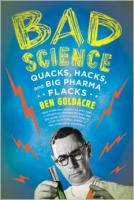
Ben Goldacre is a British doctor who has a major bone to pick with science done badly, and with the media that often misuses, misunderstands, or distorts scientific concepts (intentionally or not). His catchphrase is the pithy, "I think you'll find it's a bit more complicated than that." In his book Bad Science, he takes on multiple cases of ideas and practices that have, he argues, been propped up either by bad science or bad communication about science, such as homeopathy and the anti-vaccine movement. Lest you think he's a paid shill for the pharmaceutical industry, as he is often accused of by his detractors, Goldacre spends an entire chapter criticizing the often-faulty methods by which new drugs are tested, and the astonishing rate at which pharmaceutical companies fail to publish the results of their trials. Goldacre's intent is not merely to criticize, but also to educate. He's said in the past, "Pulling bad science apart is the best teaching gimmick I know for explaining how good science works." Over the course of the book, he explains what good science looks like (particularly double-blind experiments) and how to recognize and avoid common misunderstandings and misuses of statistics.
If all of this sounds boring, daunting, or overwhelming--don't worry! Goldacre is skilled at communicating complex ideas in layman's terms, providing interesting examples that clarify his points, and using humor to keep things from getting too heavy. For someone like me who is interested in, but not necessarily well-educated about, science issues, this book strikes the perfect balance. Interested readers might want to take a look at Ben Goldacre's other book, Bad Pharma, or Peter Daempfle's similarly-themed Good Science, Bad Science, Pseudoscience, and Just Plain Bunk: How to Tell the Difference. Fans of popular science writers like Mary Roach are also encouraged to check out Goldacre's work.
